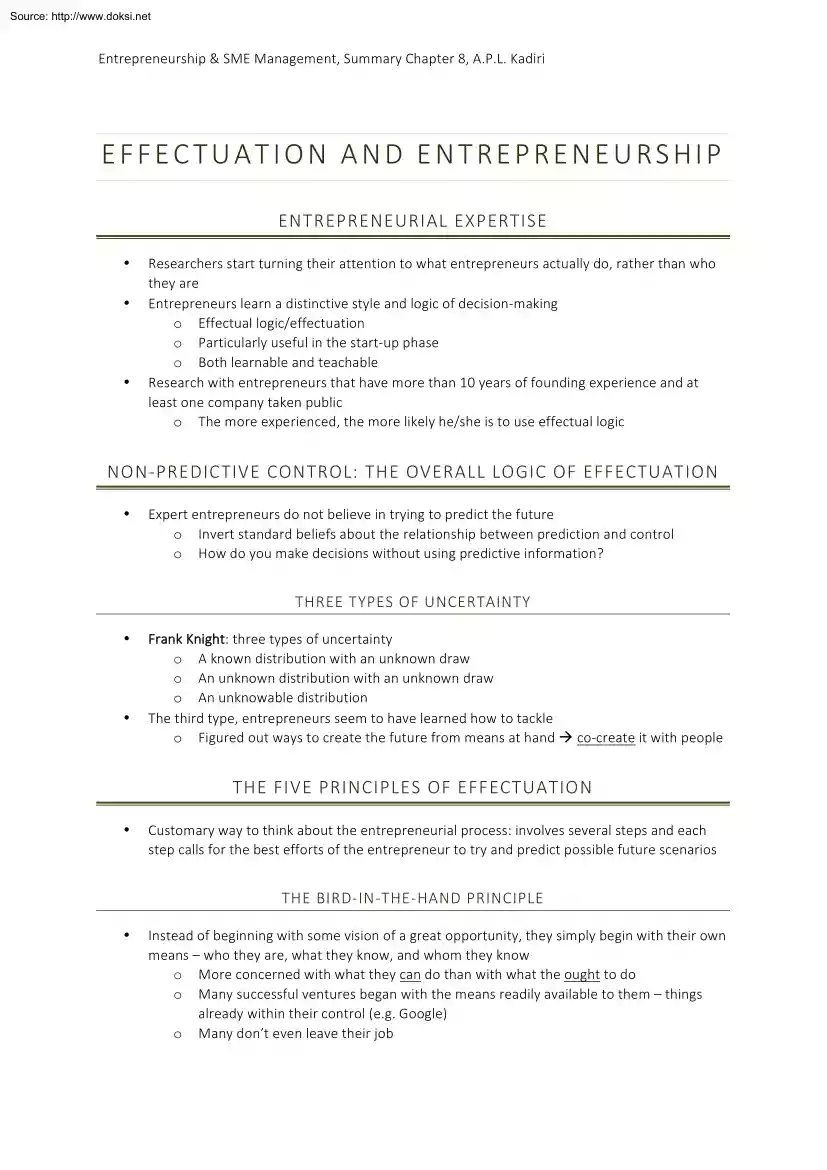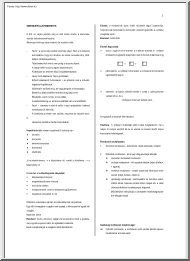Datasheet
Year, pagecount:2016, 5 page(s)
Language:English
Downloads:4
Uploaded:March 25, 2019
Size:11 MB
Institution:
-
Comments:
Attachment:-
Download in PDF:Please log in!
Comments
No comments yet. You can be the first!Content extract
Source: http://www.doksinet Entrepreneurship & SME Management, Summary Chapter 8, A.PL Kadiri E F F E C T U A T I O N A N D E N T R E P R E N E U R S H I P ENTREPRENEURIAL EXPERTISE • Researchers start turning their attention to what entrepreneurs actually do, rather than who they are • Entrepreneurs learn a distinctive style and logic of decision-‐making o Effectual logic/effectuation o Particularly useful in the start-‐up phase o Both learnable and teachable • Research with entrepreneurs that have more than 10 years of founding experience and at least one company taken public o The more experienced, the more
likely he/she is to use effectual logic NON-‐PREDICTIVE CONTROL: THE OVERALL LOGIC OF EFFECTUATION • Expert entrepreneurs do not believe in trying to predict the future o Invert standard beliefs about the relationship between prediction and control o How do you make decisions without using predictive information? THREE TYPES OF UNCERTAINTY • Frank Knight: three types of uncertainty o A known distribution with an unknown draw o An unknown distribution with an unknown draw o An unknowable distribution • The third type, entrepreneurs seem to have learned how to tackle o Figured out
ways to create the future from means at hand à co-‐create it with people THE FIVE PRINCIPLES OF EFFECTUATION • Customary way to think about the entrepreneurial process: involves several steps and each step calls for the best efforts of the entrepreneur to try and predict possible future scenarios THE BIRD-‐IN-‐THE-‐HAND PRINCIPLE • Instead of beginning with some vision of a great opportunity, they simply begin with their own means – who they are, what they know, and whom they know o More concerned with what they can do than with what the ought to do o
Many successful ventures began with the means readily available to them – things already within their control (e.g Google) o Many don’t even leave their job Source: http://www.doksinet Entrepreneurship & SME Management, Summary Chapter 8, A.PL Kadiri THE AFFORDABLE LOSS PRINCIPLE • How do you decide which ventures to build? o Conventional answer: pick the one with the best expected return • Effectual entrepreneurs: think through the downside potential à invest only what they can afford to lose o Very subjective calculation (afford and willing to lose) • The principle does two things: o
It allows us to get started immediately without waiting for investments or the perfect timing for the venture o It forces us to think through non-‐economic benefits as a key driver of our choice of venture • ‘Plunge’ decision – the decision of an employed person to leave his or her job to start a venture o In effectuation the choice does not have to be either/or à no ‘plunge’ anymore • Affordable loss is an important enhancement of bootstrapping as the primary funding strategy for starting new ventures o About two-‐thirds of the founders of Inc. 500
list of companies never took money from outside investors THE CRAZY QUILT PRINCIPLE • Understanding the market is considered key to every good business plan o Market is seen as an external force to be mapped out and conquered • Expert entrepreneurs have a very different view of the market à making a market through stakeholder relationships o They do not know for sure which market they will be in o Growing network of partnerships determines which markets they end up in or end up creating – or not à co-‐create THE LEMONADE PRINCIPLE • ‘When
life gives you lemons, make lemonade.’ • Entrepreneurs have to learn to include contingencies as inputs into their means set as they build their new ventures o Conventional notion: • Conventional notion: carefully select clear goals and use proven techniques to achieve those goals When you start with flexible goals and are focused on doing the doable, contingencies become resources to be leveraged rather than distractions to be avoided • Given the same luck, good or bad, some people learn to transform it into resources or at least into a learning experience that helps strengthen
their relationships with others, while others simply quit o How to respond to the unexpected is always within your control THE PILOT IN THE PLANE PRINCIPLE • Effectuation puts human action front and center in the entrepreneurial process Source: http://www.doksinet Entrepreneurship & SME Management, Summary Chapter 8, A.PL Kadiri • They are capable of consciously co-‐creating their future o However, not social engineering or holding utopian views à they have no problem striving for stable partial orders that can be rearranged and transformed periodically into better configurations §
‘Better’ being defined and arrived at through the very process of reconfiguration THE DYNAMICS OF EFFECTUATION IN THE START-‐UP PROCESS • Dynamics of stakeholder self-‐selection o Ask open-‐ended questions with a view to obtaining advice and emotional participation rather than target specific stakeholders for specific resources o Effectual entrepreneurs talk about their ventures to people they know and also to people they happened to meet serendipitously • What do you do when a potential stakeholder asks you to change something in your venture? • Visionary entrepreneur – someone who is
unwilling to change his or her vision based on inputs from others o Effectual entrepreneur is visionary in a very different way à persistence to keep at the process until the vision comes together through execution and co-‐creation with others • Adaptive entrepreneur – someone who quickly seizes and acts upon the advice of potential stakeholders o Expert entrepreneurs are more proactive than adaptive • Causal entrepreneur – seeks to map out the entire landscape as clearly as possible based on specific goals that he or she has set o Seek to find the best possible
fit with the market environment through strategically important stakeholders, pursuing them in a systematic fashion o Expert entrepreneurs learned through experience that they are better off treating the future as unpredictable Effectual entrepreneurs are open to letting stakeholders shape the vision and strategies of the venture to the extent of the actual commitment each stakeholder makes Source: http://www.doksinet Entrepreneurship & SME Management, Summary Chapter 8, A.PL Kadiri • Open mind regarding the extent but also type of commitment and role they might want to play • Every
effectual commitment results in new resources becoming available to the venture o Set of means increases to include the identities, reputations, preferences, abilities, knowledge, and networks of the entire group of committed stakeholders at any given point in time • Logical consequences: 1. The effectual process is likely to lead to a novel outcome 2. The effectual process is likely to reduce the costs of failure of the new venture, irrespective of the probability of failure THE IMPLICATIONS OF EFFECTUATION FOR THE PERFORMANCE OF FIRM AND ENTREPRENEUR • It is not easy to
define success or failure in the entrepreneurial setting • Developing the implications of effectuation on the entrepreneurial process occurs in stages: 1. We need to separate the performance of a venture from that of an entrepreneur 2. We need to define venture success as a continuum of possibilities a. Involuntary closure, voluntary closure, sales of assets, , initial public offering, sale of founders’ shares after decades of being a public company • When we limit ourselves to the start-‐up phase of an effectual venture, bankruptcy is a highly unlikely outcome • Upside potential may
vary depending on: o The entrepreneur’s own aspirations o How these aspirations change as the entrepreneurs’ ventures and careers evolve o How these aspirations are impacted by the stakeholders that the entrepreneurs end up building the strongest relationship with o The unpredictable events that come their way over time • Two broad categories of upside potential: o The lifecycles of the firm(s) that the entrepreneurs build o The portfolios of the firms they build over their careers Source: http://www.doksinet Entrepreneurship & SME Management, Summary Chapter 8, A.PL Kadiri
• Most enduring firms are created through an effectual process and, somewhere over the course of their lifecycle, they start to become more casual • Entrepreneurial novices may start anywhere on the causal-‐effectual spectrum o Natural tendency or may be forced to due to a lack of resources o The more resources they have available to them at the beginning of their entrepreneurial careers, the more causal their strategies are likely to be o After time a general movement to the middle occurs (both effectual and causal) § Eventually though, they become more and more likely
to prefer effectual strategies o A learning curve evolves as they experience both successes and failures à captured by the two upper curved lines § Not all entrepreneurs manage to bridge the gap between the effectual needs of starting firms and the causal needs of an established firm à very few become expert entrepreneurs
likely he/she is to use effectual logic NON-‐PREDICTIVE CONTROL: THE OVERALL LOGIC OF EFFECTUATION • Expert entrepreneurs do not believe in trying to predict the future o Invert standard beliefs about the relationship between prediction and control o How do you make decisions without using predictive information? THREE TYPES OF UNCERTAINTY • Frank Knight: three types of uncertainty o A known distribution with an unknown draw o An unknown distribution with an unknown draw o An unknowable distribution • The third type, entrepreneurs seem to have learned how to tackle o Figured out
ways to create the future from means at hand à co-‐create it with people THE FIVE PRINCIPLES OF EFFECTUATION • Customary way to think about the entrepreneurial process: involves several steps and each step calls for the best efforts of the entrepreneur to try and predict possible future scenarios THE BIRD-‐IN-‐THE-‐HAND PRINCIPLE • Instead of beginning with some vision of a great opportunity, they simply begin with their own means – who they are, what they know, and whom they know o More concerned with what they can do than with what the ought to do o
Many successful ventures began with the means readily available to them – things already within their control (e.g Google) o Many don’t even leave their job Source: http://www.doksinet Entrepreneurship & SME Management, Summary Chapter 8, A.PL Kadiri THE AFFORDABLE LOSS PRINCIPLE • How do you decide which ventures to build? o Conventional answer: pick the one with the best expected return • Effectual entrepreneurs: think through the downside potential à invest only what they can afford to lose o Very subjective calculation (afford and willing to lose) • The principle does two things: o
It allows us to get started immediately without waiting for investments or the perfect timing for the venture o It forces us to think through non-‐economic benefits as a key driver of our choice of venture • ‘Plunge’ decision – the decision of an employed person to leave his or her job to start a venture o In effectuation the choice does not have to be either/or à no ‘plunge’ anymore • Affordable loss is an important enhancement of bootstrapping as the primary funding strategy for starting new ventures o About two-‐thirds of the founders of Inc. 500
list of companies never took money from outside investors THE CRAZY QUILT PRINCIPLE • Understanding the market is considered key to every good business plan o Market is seen as an external force to be mapped out and conquered • Expert entrepreneurs have a very different view of the market à making a market through stakeholder relationships o They do not know for sure which market they will be in o Growing network of partnerships determines which markets they end up in or end up creating – or not à co-‐create THE LEMONADE PRINCIPLE • ‘When
life gives you lemons, make lemonade.’ • Entrepreneurs have to learn to include contingencies as inputs into their means set as they build their new ventures o Conventional notion: • Conventional notion: carefully select clear goals and use proven techniques to achieve those goals When you start with flexible goals and are focused on doing the doable, contingencies become resources to be leveraged rather than distractions to be avoided • Given the same luck, good or bad, some people learn to transform it into resources or at least into a learning experience that helps strengthen
their relationships with others, while others simply quit o How to respond to the unexpected is always within your control THE PILOT IN THE PLANE PRINCIPLE • Effectuation puts human action front and center in the entrepreneurial process Source: http://www.doksinet Entrepreneurship & SME Management, Summary Chapter 8, A.PL Kadiri • They are capable of consciously co-‐creating their future o However, not social engineering or holding utopian views à they have no problem striving for stable partial orders that can be rearranged and transformed periodically into better configurations §
‘Better’ being defined and arrived at through the very process of reconfiguration THE DYNAMICS OF EFFECTUATION IN THE START-‐UP PROCESS • Dynamics of stakeholder self-‐selection o Ask open-‐ended questions with a view to obtaining advice and emotional participation rather than target specific stakeholders for specific resources o Effectual entrepreneurs talk about their ventures to people they know and also to people they happened to meet serendipitously • What do you do when a potential stakeholder asks you to change something in your venture? • Visionary entrepreneur – someone who is
unwilling to change his or her vision based on inputs from others o Effectual entrepreneur is visionary in a very different way à persistence to keep at the process until the vision comes together through execution and co-‐creation with others • Adaptive entrepreneur – someone who quickly seizes and acts upon the advice of potential stakeholders o Expert entrepreneurs are more proactive than adaptive • Causal entrepreneur – seeks to map out the entire landscape as clearly as possible based on specific goals that he or she has set o Seek to find the best possible
fit with the market environment through strategically important stakeholders, pursuing them in a systematic fashion o Expert entrepreneurs learned through experience that they are better off treating the future as unpredictable Effectual entrepreneurs are open to letting stakeholders shape the vision and strategies of the venture to the extent of the actual commitment each stakeholder makes Source: http://www.doksinet Entrepreneurship & SME Management, Summary Chapter 8, A.PL Kadiri • Open mind regarding the extent but also type of commitment and role they might want to play • Every
effectual commitment results in new resources becoming available to the venture o Set of means increases to include the identities, reputations, preferences, abilities, knowledge, and networks of the entire group of committed stakeholders at any given point in time • Logical consequences: 1. The effectual process is likely to lead to a novel outcome 2. The effectual process is likely to reduce the costs of failure of the new venture, irrespective of the probability of failure THE IMPLICATIONS OF EFFECTUATION FOR THE PERFORMANCE OF FIRM AND ENTREPRENEUR • It is not easy to
define success or failure in the entrepreneurial setting • Developing the implications of effectuation on the entrepreneurial process occurs in stages: 1. We need to separate the performance of a venture from that of an entrepreneur 2. We need to define venture success as a continuum of possibilities a. Involuntary closure, voluntary closure, sales of assets, , initial public offering, sale of founders’ shares after decades of being a public company • When we limit ourselves to the start-‐up phase of an effectual venture, bankruptcy is a highly unlikely outcome • Upside potential may
vary depending on: o The entrepreneur’s own aspirations o How these aspirations change as the entrepreneurs’ ventures and careers evolve o How these aspirations are impacted by the stakeholders that the entrepreneurs end up building the strongest relationship with o The unpredictable events that come their way over time • Two broad categories of upside potential: o The lifecycles of the firm(s) that the entrepreneurs build o The portfolios of the firms they build over their careers Source: http://www.doksinet Entrepreneurship & SME Management, Summary Chapter 8, A.PL Kadiri
• Most enduring firms are created through an effectual process and, somewhere over the course of their lifecycle, they start to become more casual • Entrepreneurial novices may start anywhere on the causal-‐effectual spectrum o Natural tendency or may be forced to due to a lack of resources o The more resources they have available to them at the beginning of their entrepreneurial careers, the more causal their strategies are likely to be o After time a general movement to the middle occurs (both effectual and causal) § Eventually though, they become more and more likely
to prefer effectual strategies o A learning curve evolves as they experience both successes and failures à captured by the two upper curved lines § Not all entrepreneurs manage to bridge the gap between the effectual needs of starting firms and the causal needs of an established firm à very few become expert entrepreneurs





 Just like you draw up a plan when you’re going to war, building a house, or even going on vacation, you need to draw up a plan for your business. This tutorial will help you to clearly see where you are and make it possible to understand where you’re going.
Just like you draw up a plan when you’re going to war, building a house, or even going on vacation, you need to draw up a plan for your business. This tutorial will help you to clearly see where you are and make it possible to understand where you’re going.